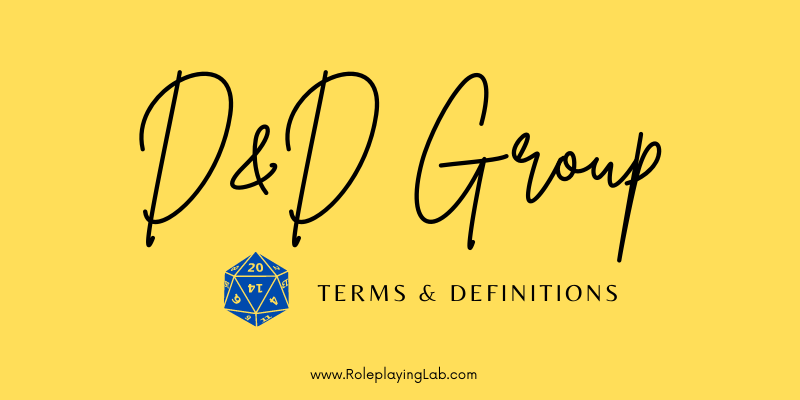If you’re new to Dungeons and Dragons (D&D), you might not fully understand all of the terms for players or player groups.
What is a D&D group called?
A D&D group is most commonly called adventurers. A group of player characters can also be called a party, adventuring band, dungeoneers, mercenaries, heroes, or explorers. A group of players is most commonly known as a player group, roleplaying group, D&D adventurer group, or D&D club.
In this article, I’ll answer everything you need to know about what D&D groups are called.
What Is a D&D Group Called? (Helpful Terms & Definitions)

D&D groups go by many names.
It’s helpful to understand the different terms and definitions. This will make playing Dungeons and Dragons more enjoyable and less confusing.
Warning: Some of the unique names at the bottom of this article might be nerdy (Read: Is D&D Nerdy? (Complete Answer)
Let’s go over the most popular terms and definitions of D&D groups.
Adventurers
If there is an “official” name for D&D groups, it is adventurers.
Most pre-made D&D modules and guidebooks refer to player characters as “adventurers.”
On top of that, the official league of players who participate in published modules is referred to as “The Adventurers League.”
Players are called adventures because, in a D&D campaign, players adventure to new places and meet with challenges.
Therefore, their characters are literal adventurers.
Adventuring Band
An adventuring band is another term for a group of player characters (PC), who adventure and explore together as part of the same group.
A “band” is just another name for “group.”
However, this is a connotation of deeper connection and closeness. When you “band together” with other people, you share something. You merge.
You “band” together with others to accomplish your goals and develop the chemistry of a group over time.
Dungeoneers
A dungeoneer is another term for a PC, who delves deep into dungeons on many adventures.
The term is pulled right from the name of the game, Dungeons and Dragons.
Dungeons and Dragons was originally known as a game about dungeon exploration and fighting dragons (along with other mythological beasts).
So, it only makes sense that dungeoneers are PCs who explore underground networks of caves and rooms, face traps and challenges along the way.
Heroes
A group of PCs is also referred to as heroes.
Players engage in heroic actions to protect the innocent and fight mythological forces and creatures.
Hence, they are called heroes for their noble efforts to save others at all costs.
Explorers
A group of PCs is also referred to as explorers.
Adventurers who explore towns, castles, dungeons, and new lands are known as explorers.
This term applies even if the characters do so via teleportation or other magical ways.
Mercenaries
Sometimes players find themselves taking on the role of a mercenary to make money, adventure, and explore.
They can call their PCs “mercenaries” for this reason.
Homebrew campaigns, one-shots, and published modules might start with a non-player character (NPC) hiring the players.
What Is a D&D Group Called? (Players)
If we’re talking about the flesh-and-blood, real-life players, then other terms apply.
It’s just as important to know what to call a group of players as it is to know the terms to describe player characters.
The players are the real humans that create and pretend to play the characters.
D&D characters are the fantasy people that populate the D&D game.
For example, I’m a DM and sometimes participate in D&D games as a player. When I engage as a player, I roleplay my D&D character.
My D&D character might be a half-elf druid or dwarven fighter.
D&D Group
You might have noticed that this entire article refers to groups of players or groups of characters as a “D&D group.”
You’ll probably hear this term a lot in D&D circles.
It applies both ways (to players and characters.) It is a catch-all term that easily identifies a collection of people connected by a shared interest in dungeons and dragons.
Player Group
Each individual participant in D&D is sometimes called a player. This usually refers to the person playing the D&D character.
However, it could also be used to describe all of the participants who join in a D&D game.
So, you might hear someone call their group a “player group.”
D&D Adventurer Group
Since the sanctioned name for players is “adventurers,” it makes sense to call the group of players a D&D adventurer group.
Yes, it’s true that the players do not physically adventure.
It’s more of an adventure of the mind and emotions—through immersive imagination.
Roleplaying Group
A group of D&D players might be called a roleplaying group, too.
You can probably guess that this term is used because the players pretend to be different characters.
Basically, they’re playing a grown-up version of “make-believe” by acting out roles as if each PC were another person.
D&D Club
A D&D club can also identify a group of players.
This term usually refers to a group of players that formed an official club.
It could also refer to the larger organization that sanctioned the club’s formation and activities schedule.
Official groups exist on online meeting apps such as Meet Up, Facebook, Discord, and even sites like Craigslist.
Another good place to find D&D clubs is at a local game store.
Many game stores host roleplaying games such as Dungeons and Dragons. They might also know of other local clubs or groups.
Here is a good video on how to find a D&D group:
What Is a D&D Group Called? (Party Names)
Another way to approach the question, “What is a D&D group called?” is to look at what a Dungeon Master or players call themselves.
Some groups give themselves a unique and creative name.
D&D clubs sometimes also go by original names that separate them from other groups.
For example:
- The Sherlock Gnomes
- The Nerd Squad
- WAMI (We Are Mentally Ill)
- The Seventh Wind
- CAST (Covert Action Strike Team)
- The Fanger Bangers
- The Fated Brew
- The Anchors
- Table Four
- The Misfits
- Dragon Knights
- The World Tree Worshippers
- Academy of the Fallen
The Misfits are an example of a diverse group. They have no racial boundaries, genders are fluid, and they hail from different backgrounds in life.
DM vs. Players: Who Should Name Your D&D Group?
Not every D&D group gives itself a name.
I think unique names are unnecessary, but they can be fun and create a better bond between players.
Naming a group can give players a sense of ownership.
That’s an argument for players naming their group. Yet, there is an equally valid argument that the DM should name the group.
As the gamemaster, the DM has the final say over everything concerning the game.
Depending on the norms of the group, the players might not get any real say in naming their characters or forming groups.
They may voice an opinion, but ultimately the Dungeon Master controls all of it.
If you’re playing with a group of people who are new to roleplaying games, I think it is a good idea to let the players name their player groups.
Experienced players who have been roleplaying for years will usually know to come up with a name that they can use beyond the current campaign and set of characters.
That said, naming a group with a quirky title can be fun for everyone involved.
Final Thoughts: What Is a D&D Group Called?
One of the great things about D&D is that you can call your players or player characters anything you want. Be as creative as possible or don’t name your group at all.
It’s up to you.
Related posts:
- Can You Defeat the Dungeon Master in D&D? (Solved)
- Is D&D Fun? (13 Things You Need To Know)
- Can You Play as a Dragon in D&D? (Answered & Solved)
